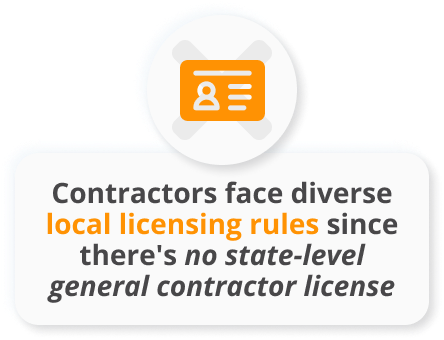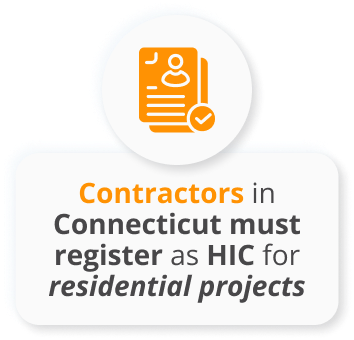Constructing Certainty: Unlocking the Secrets of Contractor Licensing in Connecticut!
In Connecticut, the landscape of contractor licensing presents a unique framework that differs significantly from many other states. Understanding this structure is crucial for contractors operating within the state, as it directly impacts the legality and compliance of their business operations. Unlike some states that offer a statewide general contractor license, Connecticut does not have a state-level licensing system for general contractors. Instead, the focus is more on local jurisdiction and specialized trade registrations.
The Distinction Between State and Local Licensing Requirements
This absence of a state-level general contractor license means that contractors must be acutely aware of the licensing requirements set forth by individual cities and towns within Connecticut. These local requirements can vary significantly from one municipality to another, encompassing aspects such as specific qualifications, insurance mandates, and bonding stipulations. Navigating these local regulations is a key component of operating legally and successfully as a contractor in Connecticut.

In contrast, the state mandates registration as a Home Improvement Contractor (HIC) for those working on residential properties. This registration is essential for anyone performing or offering home improvements over certain financial thresholds. This dual structure of local and state requirements underscores the importance of understanding both regulation levels for Connecticut contractors. It ensures that while general construction practices may not be uniformly regulated across the state, residential improvements and specialized trades adhere to a consistent state-wide standard.
Statewide Licensing Overview: Understanding the Lack of State-Level License
Connecticut’s approach to licensing general contractors is unique in that it does not offer a statewide general contractor license. This lack of a universal state-level licensing system underscores the state’s reliance on local jurisdictions to regulate and oversee general contractors.

- Decentralized Licensing System: In Connecticut, the responsibility for licensing general contractors falls to individual cities and towns, leading to a varied landscape of requirements and standards.
- Implications for Contractors: This decentralized system means that contractors must be aware of the specific licensing requirements in each area where they operate, as these can differ significantly from one locality to another.
Local Licensing Requirements: Navigating City and Town Regulations
Given the absence of state-level licensing for general contractors, understanding and complying with local regulations is essential.
- Varied Local Requirements: Each city and town in Connecticut may have its own set of rules for licensing general contractors. These can include different processes for application, varying fees, and distinct standards that contractors must meet.
- Local Authority Guidance: Contractors should consult local building departments or municipal offices for guidance on specific licensing requirements. These local authorities are the primary source of information and regulation for general contractors in their jurisdictions.
Checking Local Regulations: Steps and Considerations
To ensure compliance with local laws, general contractors should take a proactive approach:

Research
Before starting a project, research the licensing requirements in the specific city or town.

Contact Local Authorities
Reach out to the local building department or regulatory authority for detailed information on the licensing process.

Understand Scope
Clarify the scope of work allowed under each local license to ensure it aligns with your project needs.
Insurance and Bond Requirements at the Local Level
Insurance and bonding are critical components of a contractor’s responsibilities, often mandated at the local level.
- General Liability Insurance: Most local jurisdictions require general contractors to carry general liability insurance, providing protection against potential claims arising from accidents, injuries, or damages that occur on the job site.
- Bond Requirements: Some localities in Connecticut may require contractors to post a bond as a part of the licensing process. This bond serves as a financial guarantee for the completion of the project and adherence to local building codes and regulations.
- Verification: Contractors should verify the specific insurance and bonding requirements with the local licensing authority and ensure they meet these requirements before starting any construction work.

Home Improvement Contractors (HICs) Registration in Connecticut
State Registration for HICs: Essential for Residential Property Work
In Connecticut, specific regulations govern contractors working on residential properties. Anyone involved in home improvement activities is required to register as a Home Improvement Contractor (HIC) with the state. This state-level registration is crucial for ensuring that contractors adhere to standards that protect homeowners and ensure quality workmanship.

- Scope of HIC Registration: It applies to contractors who perform any form of home improvement, which includes remodeling, repairing, renovating, or building additions to residential properties.
Registration Thresholds: Criteria for Mandatory Registration
The requirement for HIC registration is triggered by specific financial thresholds related to the cost of the home improvement work.
- Single Contract Threshold: Registration as a HIC is necessary if you are undertaking a single home improvement contract worth over $200. This relatively low threshold ensures that even small-scale home improvement activities are regulated and performed by registered contractors.
- Annual Total Threshold: Additionally, registration is required if the total cost of all home improvement contracts undertaken in any 12-month period exceeds $1,000. This cumulative criterion is designed to encompass contractors who undertake multiple smaller projects that collectively represent significant work over the year.
Application Process: Accessing Licensing Information and Forms
To comply with these requirements, contractors must go through the HIC registration process:

Accessing Information
Detailed information about the HIC registration process, including the necessary forms and guidelines, can be found on the State of Connecticut Department of Consumer Protection website.

Completing the Application
The application form for HIC registration can be downloaded from the website. It requires basic information about the contractor, details of the home improvement services provided, and proof of meeting the insurance requirements.

Insurance Requirements
Contractors must provide proof of adequate insurance coverage as part of the application process. This typically includes general liability insurance, and if the contractor has employees, workers’ compensation insurance.

Submission and Fees
Once completed, the application, along with the required fee, should be submitted to the Department of Consumer Protection. The fee structure and payment methods are outlined on the website.

Processing Time
After submission, the application will be reviewed, which may take several weeks. Contractors should allow sufficient time for processing to ensure they are registered before beginning any home improvement work.
Complying with Local and State Regulations in Connecticut
Verifying Local Rules: Importance of Checking Municipal Requirements
For general contractors in Connecticut, it’s crucial to recognize and comply with the various municipal regulations that govern construction activities. Given the state’s decentralized approach to contractor licensing, the requirements can vary significantly from one city or town to another.

- Local Licensing: Contractors should investigate the specific licensing requirements of the municipality where they plan to work. This could include unique insurance and bonding requirements, experience qualifications, or even specific local exams.
- Engagement with Local Authorities: Engaging directly with local building departments or regulatory authorities is an effective way to understand and adhere to the local rules. This proactive approach can prevent legal complications and ensure smooth project operations.
- Staying Informed: Keeping abreast of any changes in local regulations is vital, as municipalities may update their requirements in response to evolving industry standards or local legislation.
Registration for Home Improvement: Mandatory Steps for Compliance
In addition to local requirements, contractors performing home improvement work on residential properties in Connecticut must comply with state registration requirements.
- State Registration: Contractors must register as Home Improvement Contractors (HICs) with the State of Connecticut if they engage in residential projects exceeding certain financial thresholds.
- Financial Thresholds for Registration: The two key thresholds are a single contract over $200 and a cumulative total of over $1,000 in home improvement contracts within a 12-month period.
- Application Process: Contractors must complete the HIC registration process, which includes submitting an application form along with proof of insurance and the required fee to the Department of Consumer Protection.
Consumer Protection: The Role of Licensing and Registration in Consumer Safety
The licensing and registration requirements in Connecticut play a critical role in consumer protection.
- Ensuring Contractor Credibility: These regulations help ensure that contractors working in Connecticut are qualified, experienced, and financially stable, thereby protecting consumers from substandard work or fraudulent practices.
- Insurance and Bonding Requirements: Mandates for insurance and bonding provide financial protection to consumers in case of accidents, property damage, or failure to complete a project as per the contract.
- Transparency and Trust: Licensing and registration contribute to a more transparent and trustworthy marketplace, where consumers can make informed decisions when hiring contractors for their home improvement or construction needs.
Frequently Asked Questions (FAQ)
These are common questions about General Contractor License in Connecticut.
No, Connecticut does not have a state-wide general contractor license. Licensing requirements are determined by local municipalities.
Home Improvement Contractors must register with the state if they perform or offer home improvements over $200 for a single contract or over $1,000 in a 12-month period.
Application forms for HIC registration are available on the Connecticut Department of Consumer Protection website at https://www.ct.gov/dcp/.
While not a state requirement, general liability insurance is often required by local jurisdictions in Connecticut for contractors.
Yes, contractors in Connecticut who have employees must carry workers’ compensation insurance as per state law.

